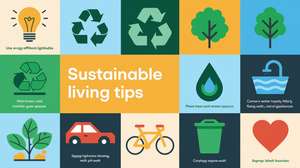
10 Practical Tips for Reducing Your Environmental Footprint
Reducing your environmental footprint is crucial for protecting our planet and ensuring a sustainable future. Even small changes in your daily habits can collectively make a significant impact. Here are ten practical tips to help you reduce your environmental footprint and contribute to a healthier Earth.
1. Adopt a Plant-Based Diet
Switching to a plant-based diet can significantly reduce your environmental footprint. Plant-based foods generally require fewer resources and produce fewer greenhouse gases compared to animal products.
- Environmental Benefits: Lower greenhouse gas emissions, reduced water usage, decreased land degradation.
- Easy Ways to Start: Incorporate more fruits, vegetables, legumes, and grains into your meals. Try Meatless Mondays to gradually transition.
2. Use Energy-Efficient Appliances
Energy-efficient appliances consume less energy, reducing your carbon footprint and lowering your utility bills. Look for products with the ENERGY STAR label.
- Environmental Benefits: Reduced energy consumption, lower greenhouse gas emissions.
- Recommended Products: ENERGY STAR Certified Appliances
3. Opt for Sustainable Transportation
Transportation is a major contributor to carbon emissions. Opting for sustainable modes of transport can make a big difference.
- Environmental Benefits: Reduced carbon emissions, decreased air pollution.
- Tips for Implementation: Use public transportation, carpool, bike, or walk. Consider electric or hybrid vehicles for longer commutes.
4. Reduce, Reuse, Recycle
The three Rs—Reduce, Reuse, Recycle—are fundamental to minimizing waste and conserving resources.
- Environmental Benefits: Decreased landfill waste, reduced resource extraction, lower energy consumption.
- Practical Steps: Reduce consumption of single-use items, repurpose materials, and ensure proper recycling.
5. Conserve Water
Water conservation is essential for maintaining healthy ecosystems and reducing energy use.
- Environmental Benefits: Preservation of water resources, lower energy use for water treatment.
- Tips for Conservation: Fix leaks, use water-saving fixtures, and practice mindful water use during daily activities.
6. Support Renewable Energy
Switching to renewable energy sources can help reduce dependence on fossil fuels and decrease greenhouse gas emissions.
- Environmental Benefits: Lower carbon footprint, reduced air pollution.
- How to Get Started: Explore options for solar, wind, or geothermal energy for your home. Look into green energy programs offered by utility companies.
7. Choose Eco-Friendly Products
Eco-friendly products are designed to have a lower environmental impact throughout their lifecycle.
- Environmental Benefits: Reduced pollution, less waste, and lower resource use.
- Recommended Brands: Eco-Friendly Products on EarthHero
8. Participate in Local Conservation Efforts
Engaging in local conservation activities helps protect local ecosystems and promotes environmental awareness.
- Environmental Benefits: Enhanced local biodiversity, improved community engagement.
- How to Get Involved: Join local conservation groups, participate in clean-up events, or volunteer at nature reserves.
9. Educate Others
Spreading awareness about environmental issues can inspire others to take action and make more sustainable choices.
- Environmental Benefits: Increased community support for environmental initiatives, broader impact.
- Ways to Spread Awareness: Share information on social media, host educational events, or participate in community discussions.
10. Make Your Home More Sustainable
Implementing sustainable practices in your home can significantly reduce your overall environmental impact.
- Environmental Benefits: Lower energy consumption, reduced waste.
- Easy Home Improvements: Install energy-efficient lighting, use smart thermostats, and implement water-saving measures.
Conclusion
Reducing your environmental footprint is essential for protecting our planet and ensuring a sustainable future. By adopting these practical tips, you can make a meaningful impact and contribute to a greener, healthier world. Start with small changes and gradually incorporate more sustainable practices into your daily life.





